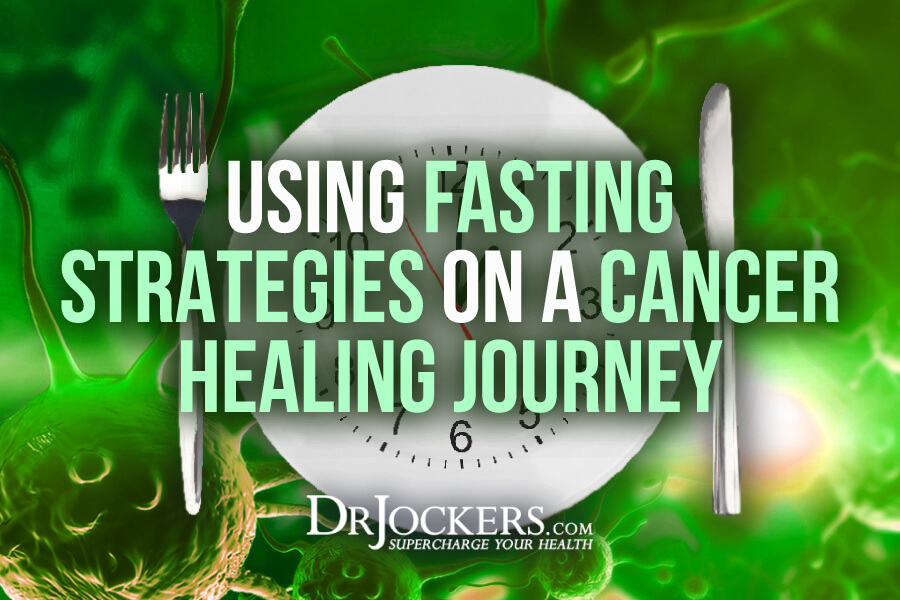 Using Fasting Strategies for Natural Cancer Healing
Using Fasting Strategies for Natural Cancer Healing
Fasting is simply what you are doing when you are not consuming food. When you go to bed at night and don’t eat again until breakfast that is a fasting period. What is not talked about enough is how actually extending that fasting time can have profound healing benefits on the body. In this article, you will learn about fasting strategies with specific intentions of targeting cancer growth in the body.
You may have noticed this but fasting seems to be a built-in mechanism for many animals to overcome sickness. When your pet doesn’t feel well, they won’t eat. Even humans seem to get a bit nauseous when they are sick which steers us away from eating. It seems like this is intentional and science supports our intuition on this one.

Fasting Benefits
Fasting has a number of benefits that all contribute to a healthy body. They can be taken advantage of as needed or even on a daily basis.
It is truly one of the safest and cost-effective healing tools you can use. Using specific fasting strategies, you can take advantage of these benefits.

Boosts Immunity
Digestion is an energy-demanding process. Once the body is relieved of digestion, energy is diverted towards other things like immune regulation. This is one of the primary reasons fasting strategies are powerful for healing cancer.
Fasting improves the regulation of inflammatory cytokines Interleukin-6 and Tumor Necrosis Factor Alpha. These are highly inflammatory and are often elevated in those with cancer.
Consequently, studies have shown that particular fasting strategies are able to down-regulate these inflammatory molecules to boost the immune system (1, 2, 3).
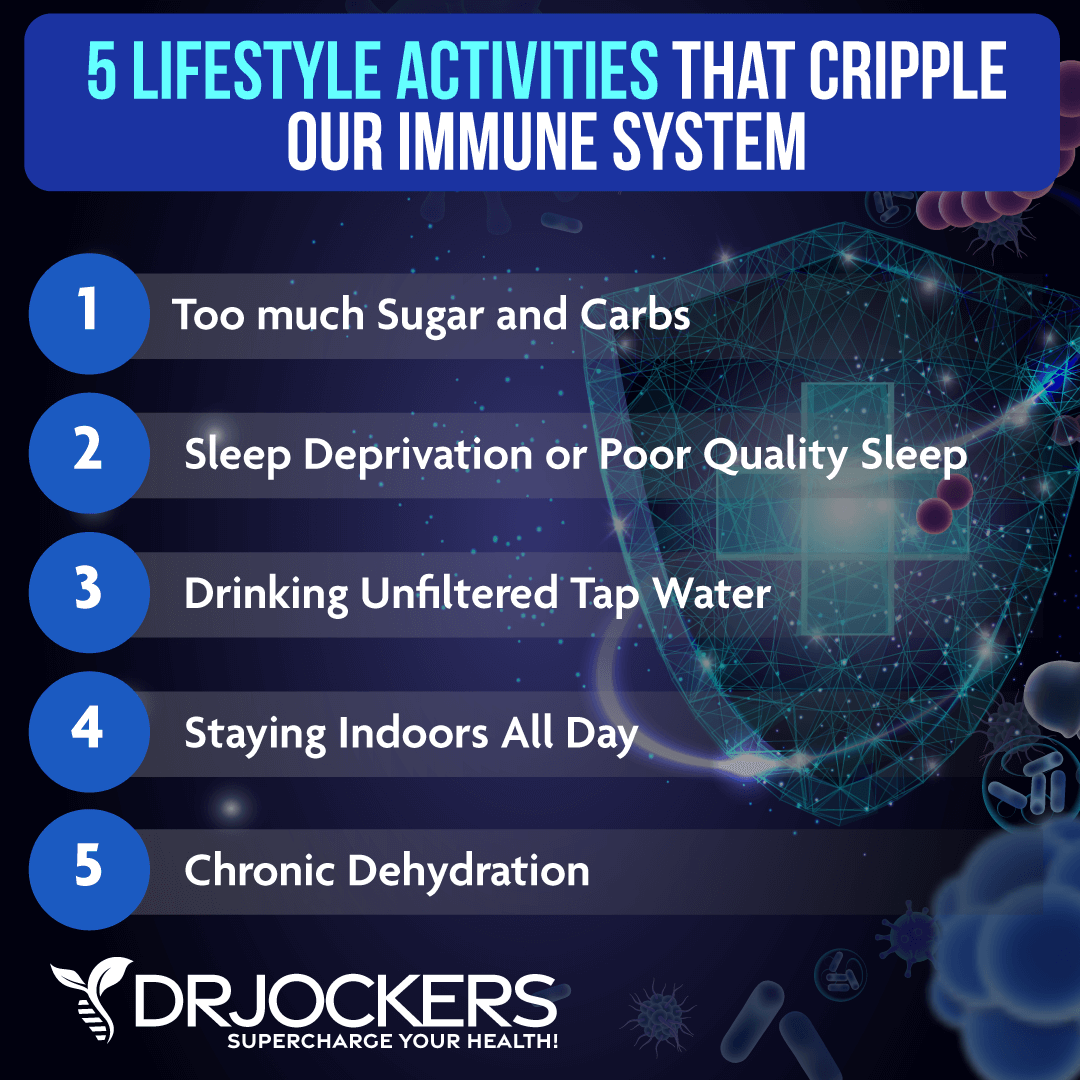
Stimulates Autophagy
Another powerful reason to incorporate fasting strategies is to stimulate autophagy. This process begins occurring as insulin levels drop, especially past the 16-24 hour mark for most people. This process is where old and damaged cells are swept up and recycled for energy, stimulating the formation of new cells.
As we know, cancer cells are metabolically damaged and serve no beneficial function to the human body. Prolonged fasting helps the body target and get rid of them in addition to inhibiting viral and parasitic replication. The benefits of fasting strategies extend further to the brain, protecting it from abnormal growth, toxins, and chronic inflammation (4).
Remarkably, this effect also stimulates mitochondrial biogenesis. It is well known that the mitochondria of cancer cells are damaged, producing massive amounts of waste products, oxidative stress, and contributing to inflammation. Fasting strategies can help stimulate the formation of new, more efficient mitochondria which helps to reverse these effects (5).
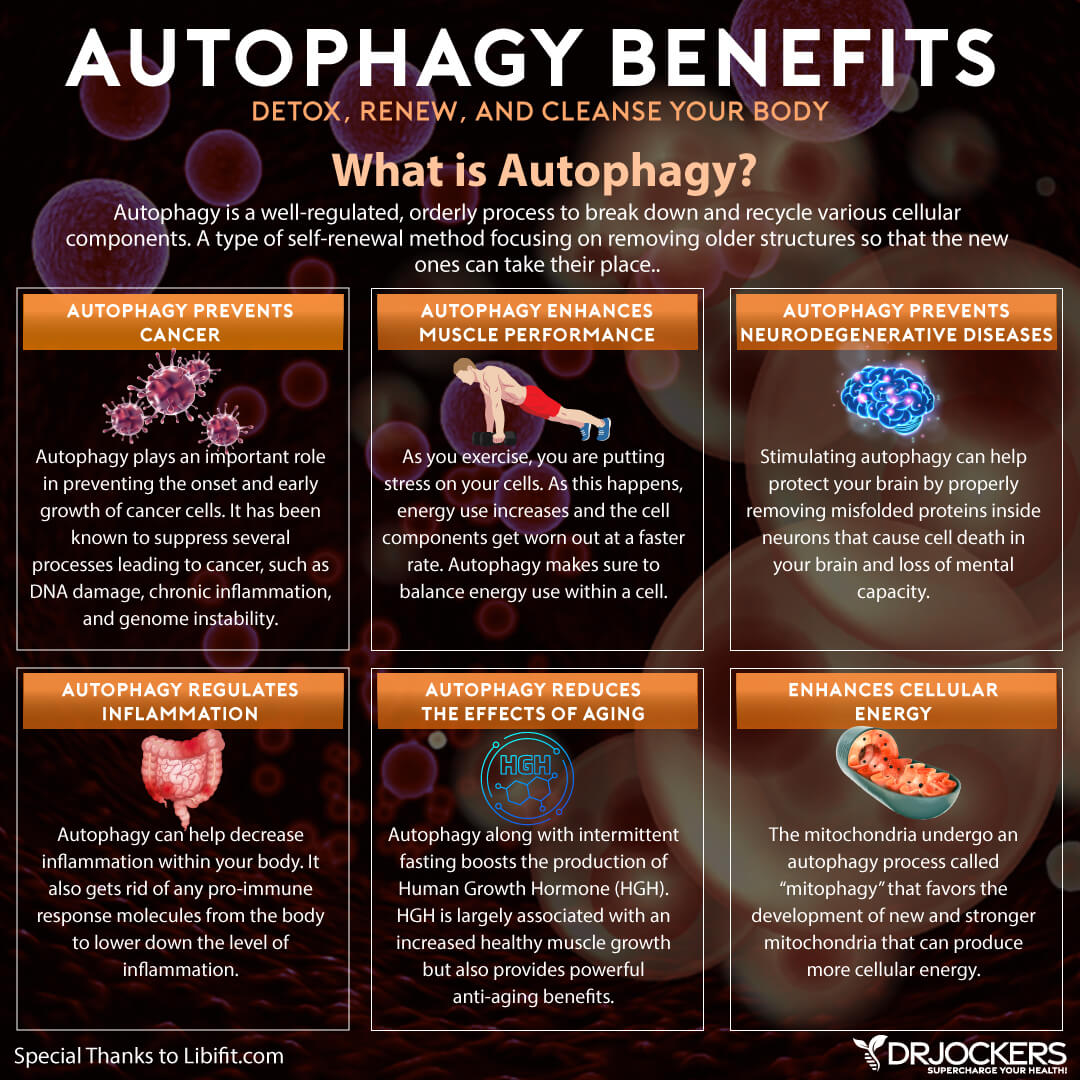
Improves Genetic Repair
There is a correlation between fasting practices and increased longevity and lower instances of disease. At the cellular level, it seems that cells tend to live longer when food is scarce. This is likely because fasting strategies enhance genetic repair to keep cells functioning well.
When food is scarce, the body slows down cell division as it is an energy intensive process. Considering cancer cells are characterized by rapid and uncontrolled growth, this is a significant finding.
One of the reasons this may be the case is how fasting alters human growth hormone (HGH). HGH is one of the primary hormones that controls cellular repair, stimulates fat burning, and prevents muscle wasting. Miraculously, a recent study found that a 24-hour fasting period increased HGH by 2000% and 1300% in men and women, respectively (6).
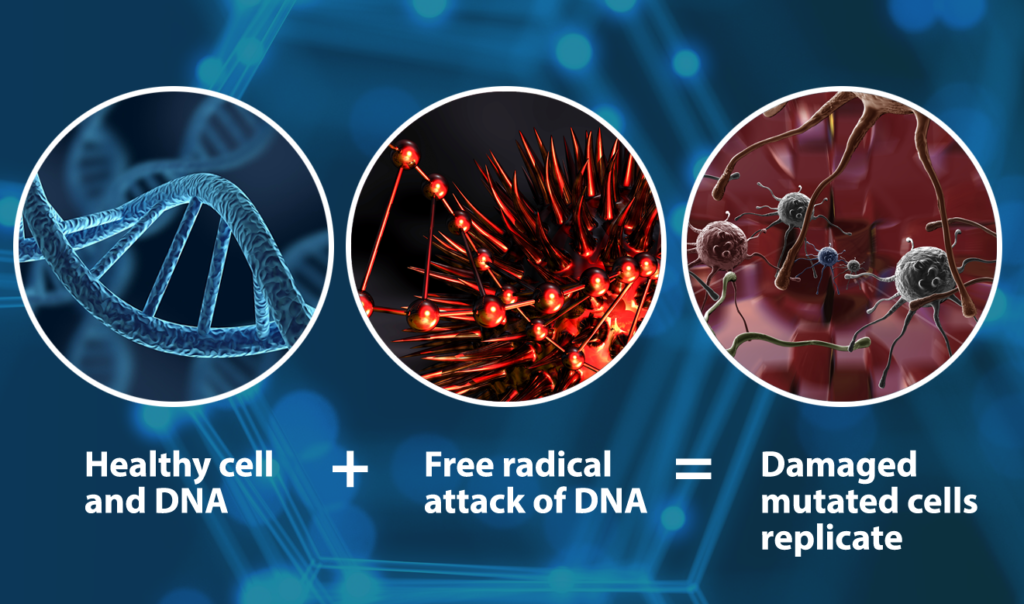
Improves Insulin Sensitivity
Traditionally, our ancestors were prone to going long periods of time without eating any food. This was because, before modern farming practices, we did not have an abundance of food available to us at all times.
Food abundance and a high level of processed, carb-dense foods, have led to modern eating patterns that contribute to blood sugar dysregulation and insulin resistance. These blood sugar issues are the pinnacle of chronic diseases such as diabetes, heart disease, and even Alzheimer’s.
As we talked about HGH in the previous section, and its importance for putting the body in a healing state; insulin is its direct inhibitor (7, 8). Therefore, if we would like to give the body a fighting chance against cancer, we need to regain insulin sensitivity and boost HGH as much as possible. Fasting can help achieve both of these goals.
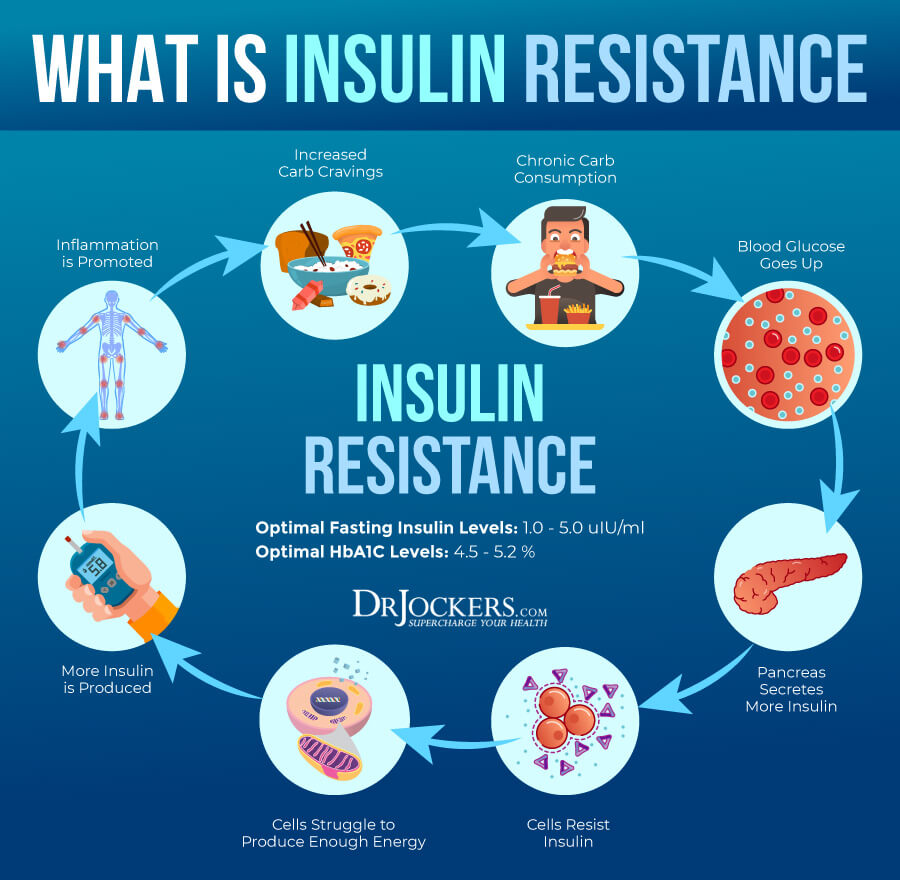
Why Cancer Can Be Targeted By Fasting
Many dietary strategies have been highlighted to have benefits for those with cancer. In addition to cancer-fighting nutrients and a ketogenic diet, fasting is powerful for boosting the body’s cancer-fighting ability (9).
These benefits have even been shown to carry into cancers such as leukemia. There are several mechanisms by which fasting can improve cancer outcomes and you can learn more details about many of these pathways in the in-depth article here.
By inhibiting IL-8 to prevent angiogenesis (10, 11)
Depriving Cancer cells of sugar, their preferred energy source (12)
Improving White Blood Cell function to improve immune targeting of cancer cells
Upregulating AMP-K to help prevent cancer cell sugar metabolism
Inhibiting the mTOR pathway to prevent rapid cell growth
Stimulating natural apoptosis (programmed cell death) of defective cells.
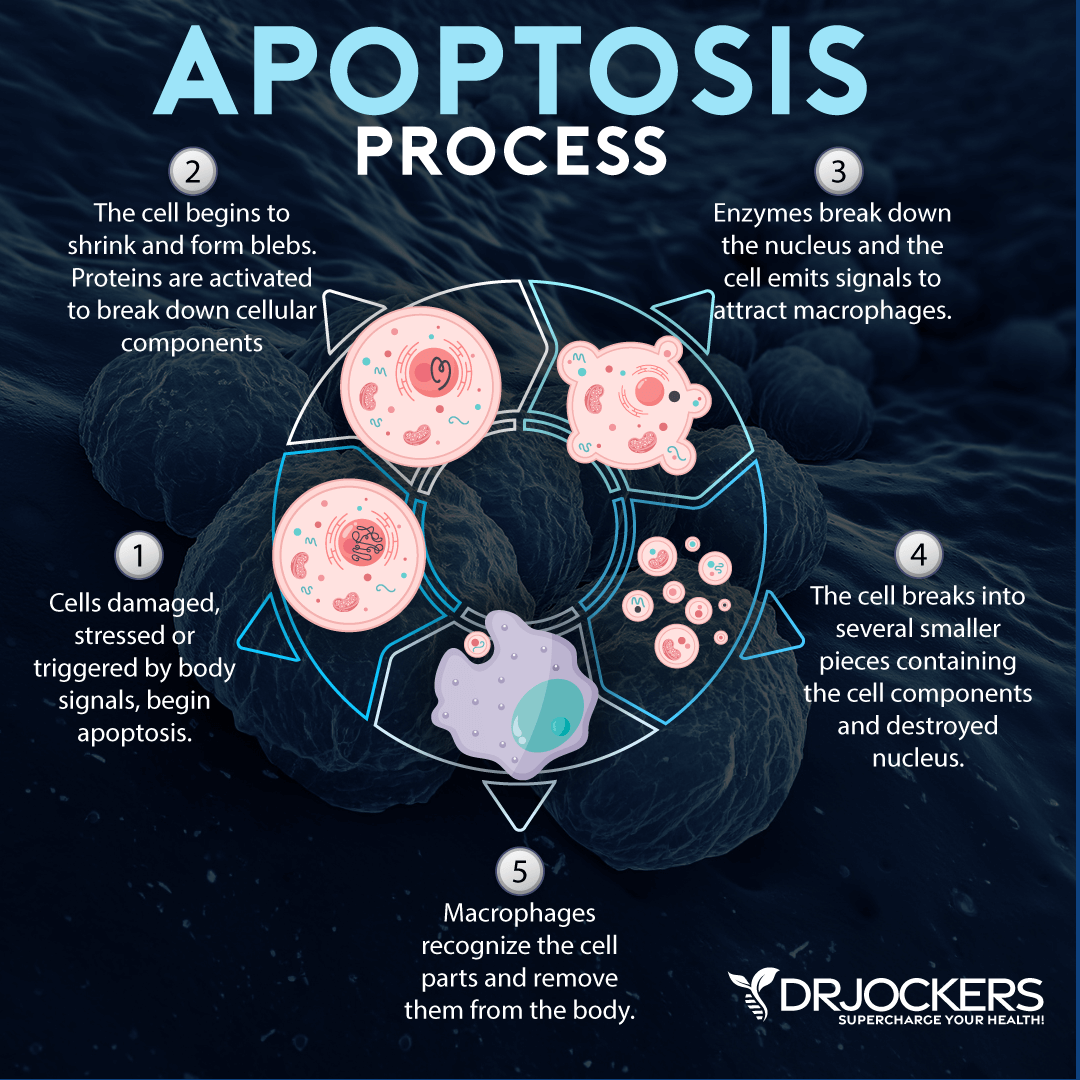
The Undifferentiated State of Cancer Cells
There is a long list of effects that can be documented here, but for one last and incredibly significant effect of fasting: First, understand that cancer cells are like regular cells, before they decide what they are going to be. That means they are “undifferentiated”. As cells get older, they “decide” what role they will serve in the body and “differentiate into an immune cell or possibly a hepatic (liver) cell or whatever the body needs at that particular moment.”
Cancer cells are stuck in the undifferentiated state and simply replicate out of control. Miraculously, there is evidence to show that fasting may actually promote the differentiation of cancer cells and unlock them from this harmful cycle (13).
For more information on mechanisms by which fasting and the ketogenic diet may improve the body’s fight against cancer, check out this article: How Sugar Feeds Cancer Growth
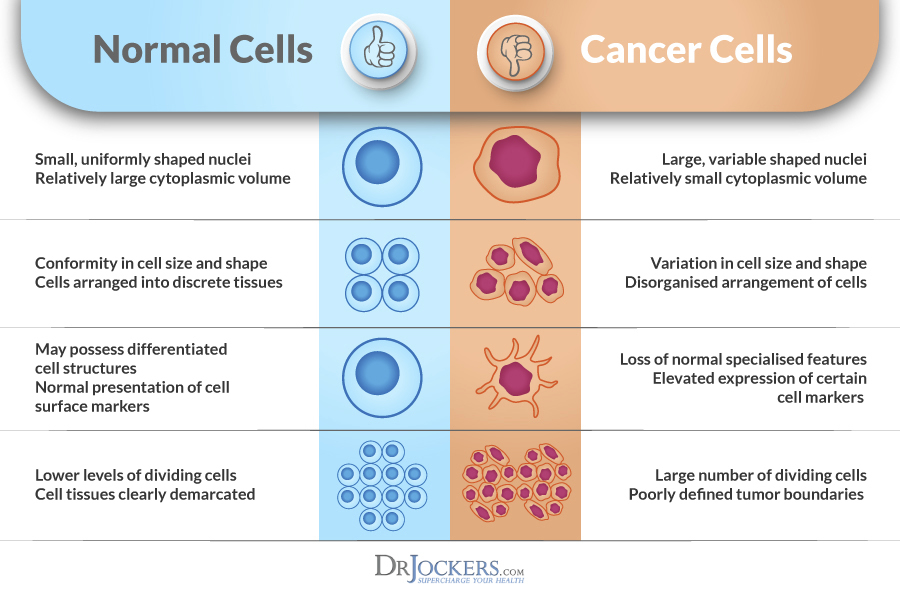
Importance of Mitochondrial Health
We know from scientists like Otto Warburg and Thomas Seyfried that cancer cells have damaged mitochondria. Mitochondria are what produce all of the energy for our cells to carry out normal functions. When they become damaged, cells become inefficient and produce rampant oxidative stress. This leads to high amounts of inflammation.
The good thing about this is that fasting strategies can be used to promote autophagy and target the damaged cells. Because of the benefits of fasting for mitochondrial health, there is not only an improvement in cancer outcomes but also an improvement in almost every other aspect of health. Fasting is a great way to promote healthy mitochondria and help beat or prevent many different chronic diseases.
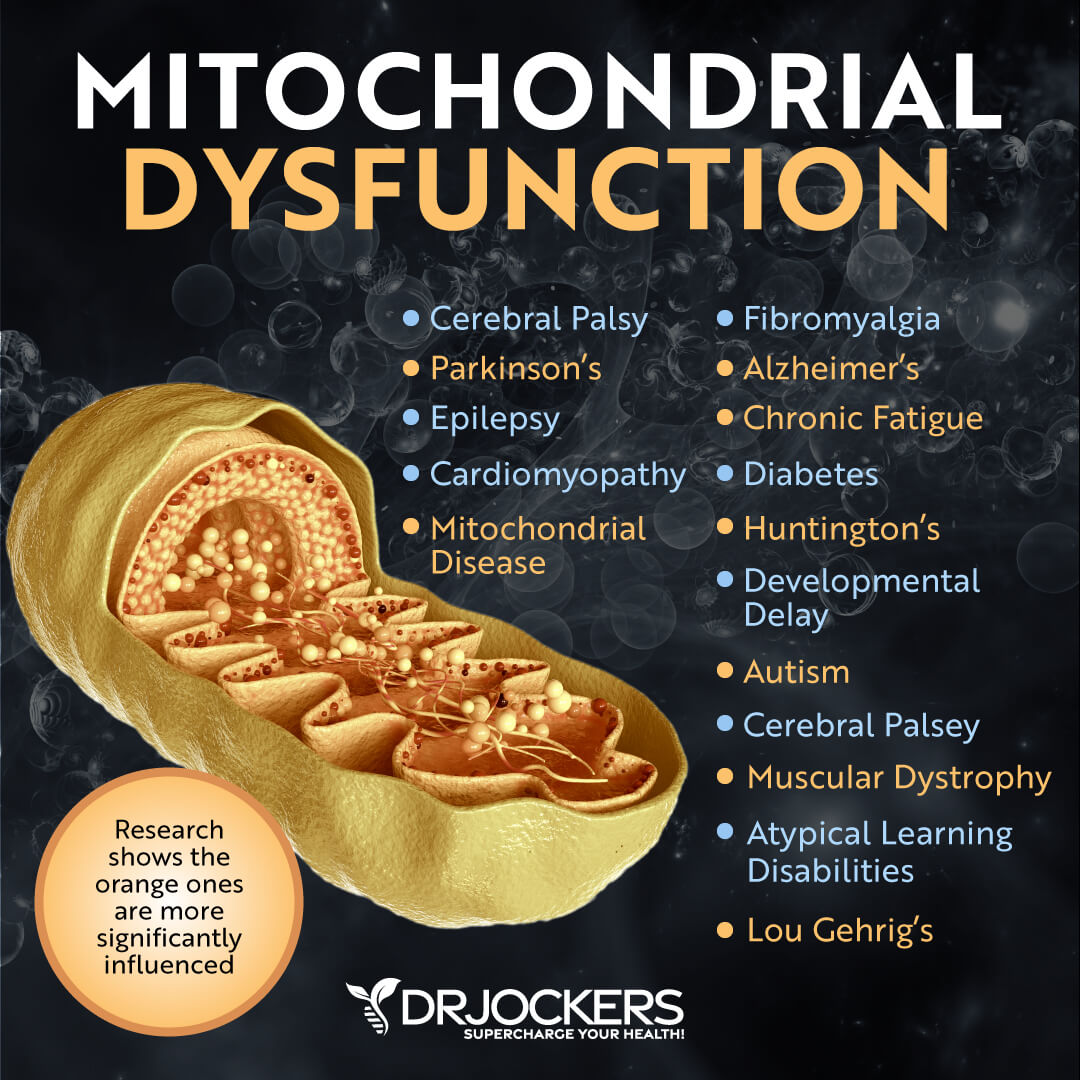
Fasting Strategies for Cancer
There are a number of ways to fast. Fasting strategies can vary depending on what the intended goal is. Shorter duration fasts have benefits for inflammation, digestion, and metabolism.
Longer term fasts (24-72 hours and beyond) are where profound autophagy and deep ketosis are achieved to promote larger therapeutic benefits.
Carb & Protein Restriction
Ketosis is a metabolic state where the body burns fat for energy instead of sugar. There is a large body of evidence suggesting that being in a ketogenic state is beneficial when trying to fight cancer. This is likely because cancer cells primarily burn sugar for energy and ketosis does not provide that for them.
While fasting altogether can get you into ketosis, so can doing a fat fast. During a fat fast, you simply avoid protein and carbs, opting for healthy fats instead to provide a source of ketones for energy. This can be done as an intermittent fasting strategy, having a Fat Burning Coffee (or something similar) for breakfast. Alternatively, healthy fats can be used during a prolonged fast of 48-72 hours.
Using healthy fats to support ketosis and fasting from protein/carbs for periods of time is a great cancer fighting strategy because it deprives cancer cells of sugar and offers ketones as energy for healthy cells. Common fasting windows are outlined below in the following graphic:
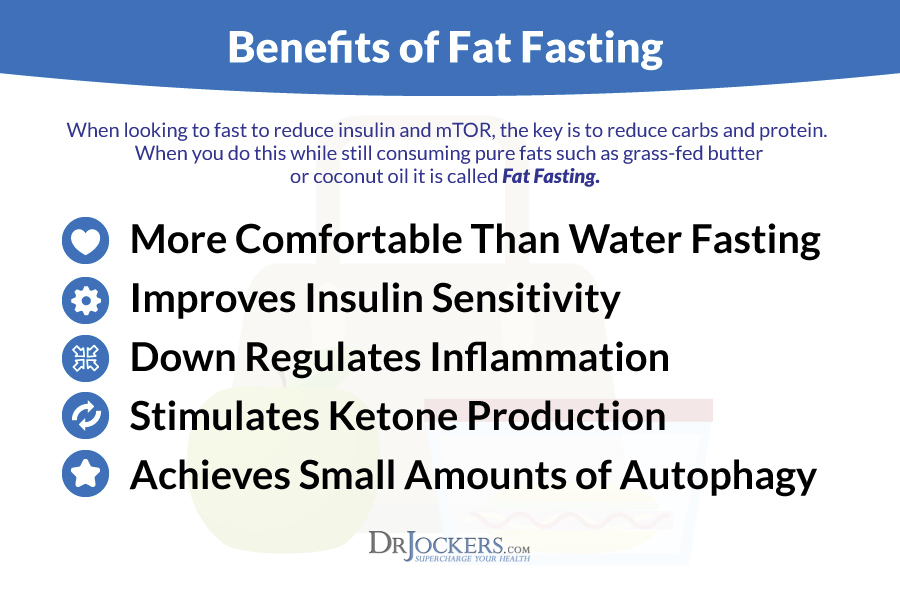
Prolonged Fasting
During fast, healthy cells become highly resilient to stress. At the same time, cancer cells seem to become vulnerable to apoptosis either by the immune system or external therapies like chemotherapy and radiation.
While intermittent, shorter fasts, provide many benefits, prolonged fasting strategies can be greatly beneficial in cancer conditions. I would consider any period greater than 48 hours a prolonged fast. This can be done either by consuming water or with the assistance of healthy fat sources as mentioned above.
A strategy that I have seen success with is performing a 48-72 hour fast, once per week to gain the benefits mentioned above and allow the body to hone in on the cancer at hand. These longer fasts are fantastic for fast growing cancers as they further restrict glucose utilization and stimulate higher levels of autophagy than shorter fasts.
I have had clients do 21-day water fasts for deep healing. It can be uncomfortable for the first 2-3 days but after the individual adapts it gets easier to follow. It is important to reduce stress and focus on resting as much as possible during these periods. I typically recommend adding some salts to the water and also doing herbal teas as well to enhance the benefits.
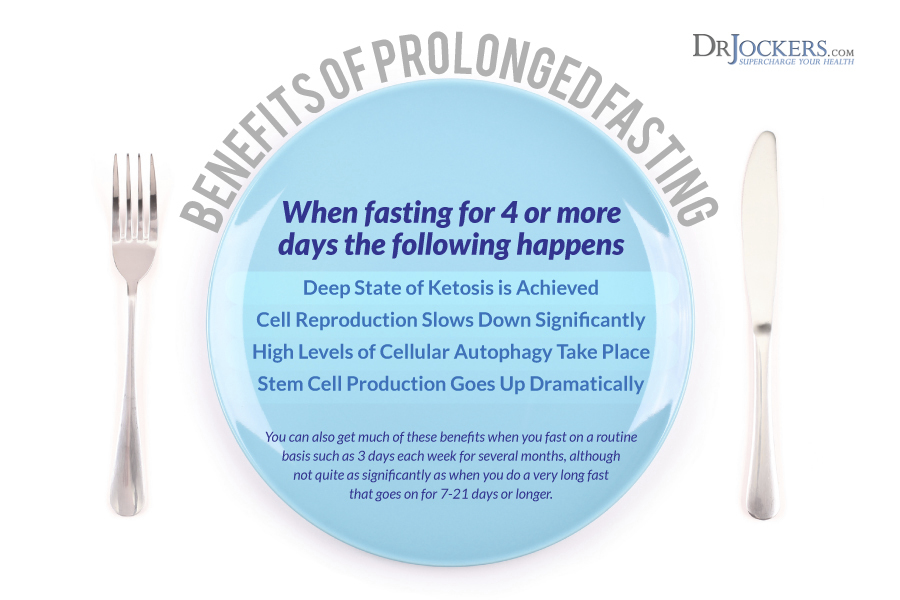
Powerful Combinations
Fasting is a powerful healing strategy, not only does it provide great benefits on its own, but it actually makes for a great combination with other cancer healing modalities. There are many different natural approaches for supporting the body to heal cancer, the following are some that I recommend most often.
Plant-Based Ketogenic Nutrition
Part of the benefit of fasting is depriving cancer cells of sugar, their preferred energy source. This same benefit can be derived from following a ketogenic diet that supports the body’s ability to burn fat as energy instead of sugar, putting cancer cells at a metabolic disadvantage.
In addition to backing off of carbs and sugar, there is also evidence that reducing protein intake may be an important strategy in cancer to limit activation of the mTOR pathway. mTOR is a biological pathway implicated with the growth of cells in different tissues and has been found to be overly expressed in cancerous conditions. Consequently, protein consumption is one of the activators of this pathway.
Finally, numerous plant compounds have been found to inhibit cancer growth and development by many different mechanisms. The culmination of the factors above makes a plant-based ketogenic diet, along with fasting strategies, a powerful arsenal in the fight against cancer. I have written about this approach here: Plant-Based Ketogenic Diet for Cancer
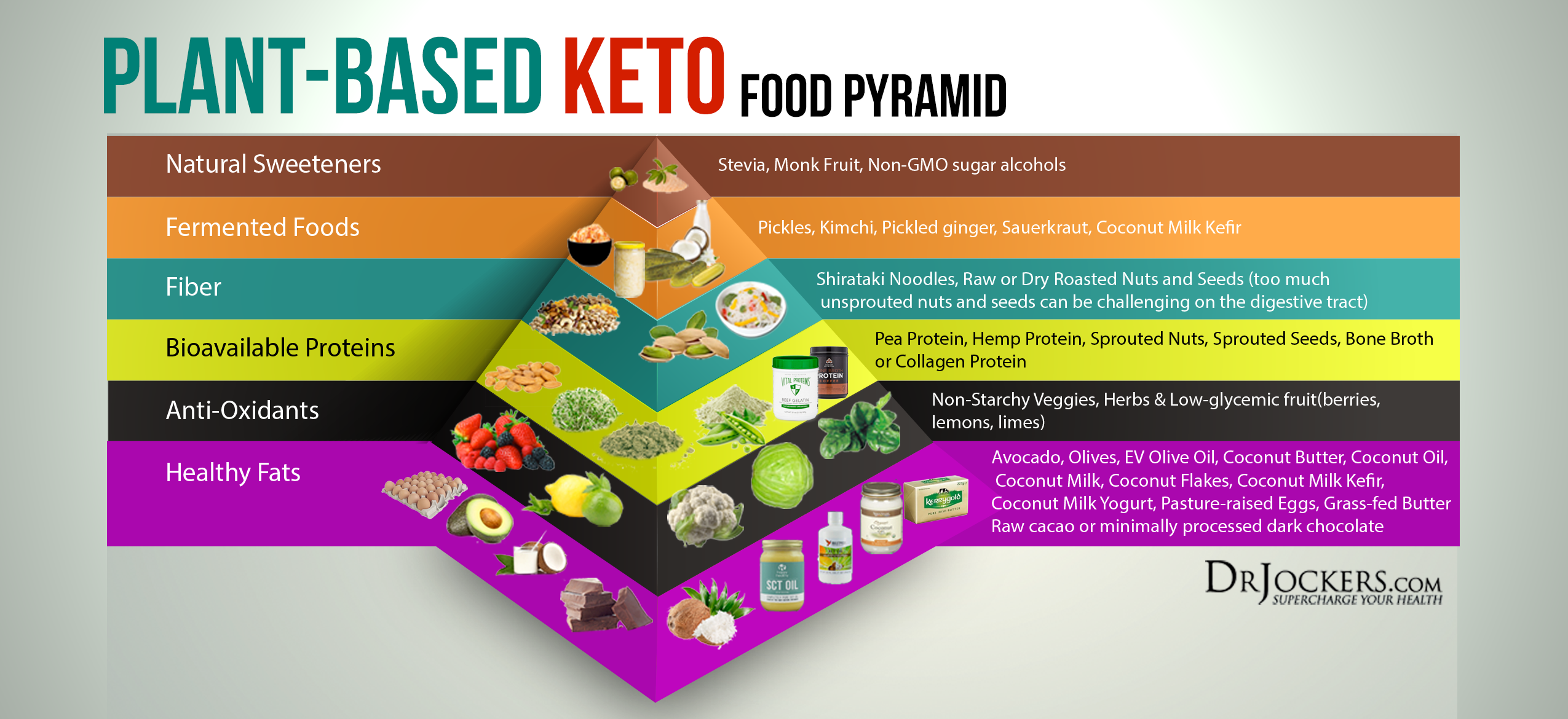
Hyperbaric Oxygen
Cancer cells thrive in high-sugar, low oxygen environments. As they engulf as much sugar as possible, they churn out lactic acid and make their surrounding environment extremely acidic.
Hyperbaric oxygen is a therapy in which someone is placed in a chamber that is pressurized and contains a significantly higher amount of oxygen than in normal atmospheric conditions. This combination super-enriches the body with oxygen.
The combination of fasting strategies along with hyperbaric oxygen therapy provides a powerful combo to place cancer cells at a disadvantage while boosting up the immune system and supercharging to rest of your cells. The combination of ketosis, which can be brought about by fasting, and hyperbaric oxygen therapy has been shown to slow tumor progression and support ketone formation (14).
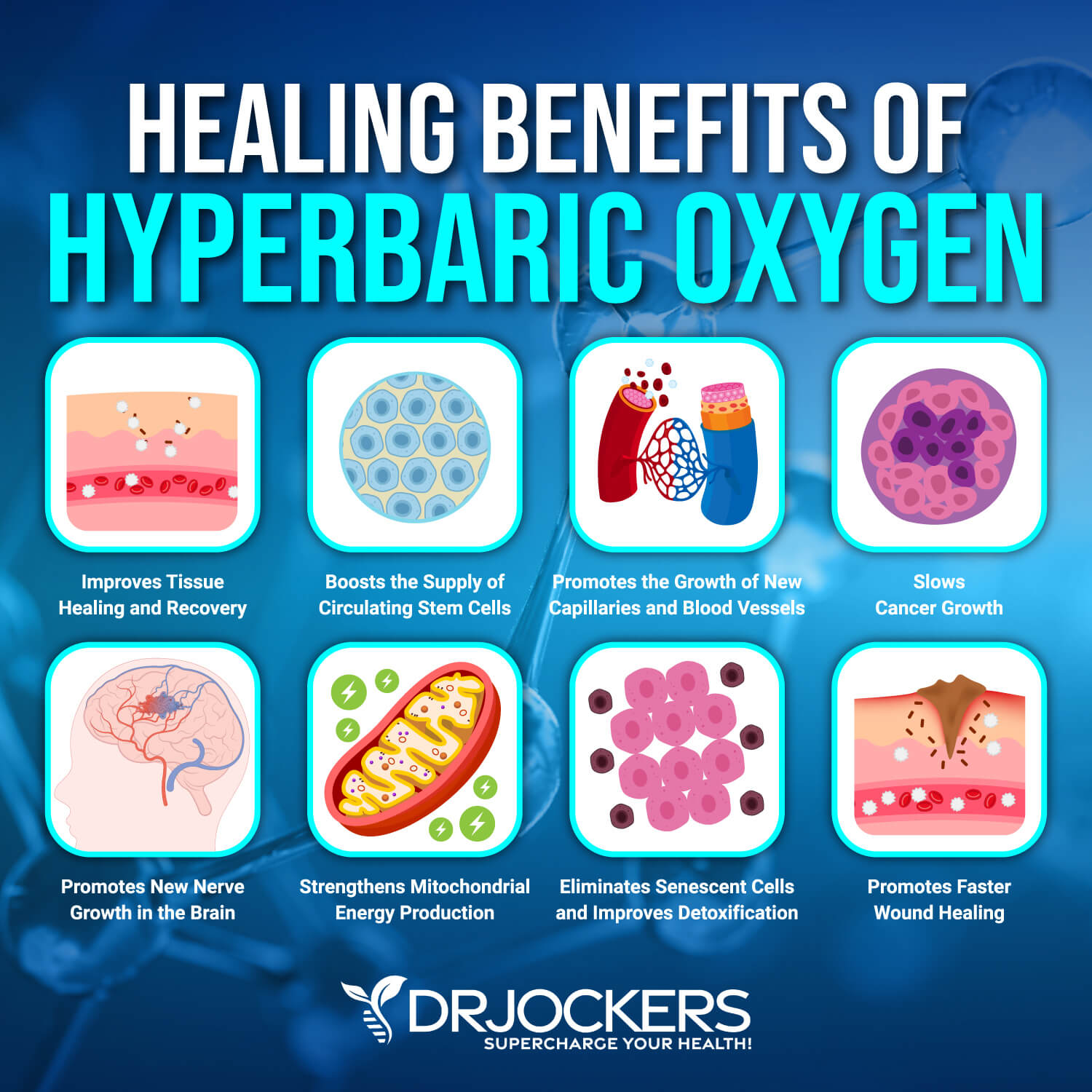
Detoxification Practices
Almost everyone has some level of toxicity in their bodies. It is a stressor that we cannot avoid. It is common to find that those with cancer have been subjected to higher levels of toxicity than most and therefore must partake in daily detoxification activities to help ease the stress on the body and free up energy to perform other tasks.
Fasting is one of these strategies. In addition, hydrating well, using detoxifying herbs, getting adequate exercise, using a sauna 2-4 times per week, and using activated charcoal, and coffee enemas can all be great for assisting your body in getting rid of toxins.
To read more in-depth about these practices, I have an article outlining them here: 10 Daily Detoxification Strategies
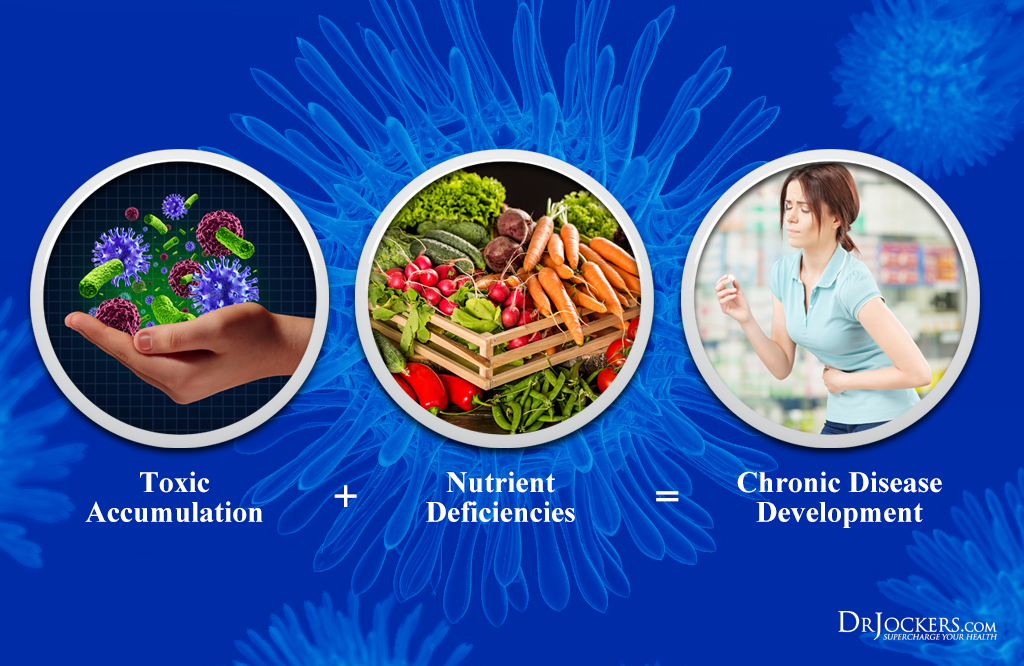
Conventional Therapies and Cancer
Interestingly enough, fasting strategies have actually been shown to improve cancer outcomes when used in conjunction with conventional strategies such as chemotherapy or radiation. This may be because fasting restricts fuel supply to cancer cells and sensitizes them to other stressors. This means that it may be possible to use lower doses of chemo or radiation while achieving greater results and minimizing side effects.
A 2009 case study report documented the experience of 10 patients who were undergoing high-dose chemotherapy and elected to undergo various fasting protocols (15). The fasting ranges for these patients ranged from 48–140 hours leading up to their chemotherapy treatments as well as 5–56 hours following treatment.
The authors of this report observed that these 10 patients were able to avoid common side effects of chemotherapy such as fatigue, weakness, and digestive upset by fasting leading up to and following treatment. The best part about this is that these patients avoided side effects without lessening the effectiveness of the chemotherapy.
Another 2016 study separated 20 patients into 3 groups: (16)
- 24-hour fast leading up to platinum-based chemotherapy
- 48-hour fast leading up to platinum-based chemotherapy
- 72-hour fast (48 hours leading up to and 24 hours following platinum-based chemotherapy)
The authors of this study found that longer fasting windows were associated with lower inflammation markers and DNA damage indicators following treatment. All fasting groups experienced a lower instance of chemotherapy side effects.
Finally, a 2018 study implemented a 60-hour fasting protocol split into a 36-hour fast before treatment and 24 hours following (17). The authors of this study concluded that fasting improved the quality of life during chemotherapy treatment by reducing side effects such as fatigue.
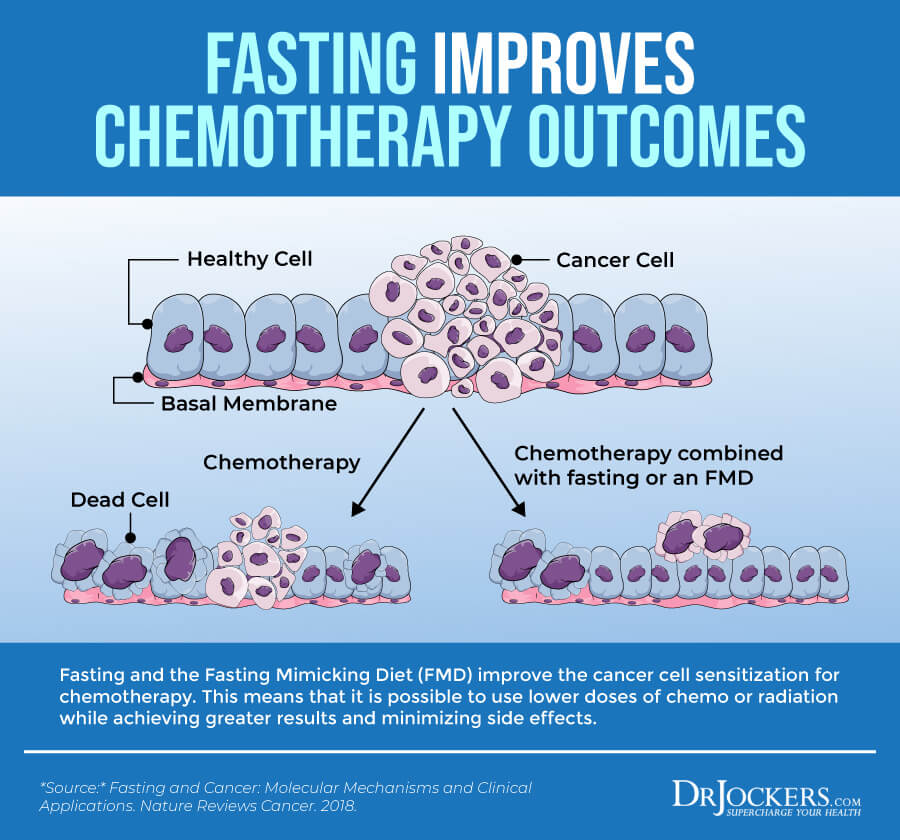
Press Pulse Method to Metabolically Restrict Cancer Growth
Dr Thomas Seyfried is a top cancer researcher at Boston College and the author of the groundbreaking book, Cancer as a Metabolic Disease. He developed the Press-Pulse treatment for cancer in which the individual weakens cancer cells by restricting glucose while targeting cancer with powerful oxidative therapies such as chemotherapy, radiation, hyperbaric oxygen (HBOT), or IV vitamin C.
A suggested protocol based on the Press-pulse method proposed by Dr. Seyfried is to:
- Follow a ketogenic meal plan
- Fast at least 14-hours leading up to a chemotherapy or radiation treatment
- Break the fast shortly after treatment
- Consume plenty of plant-based anti-cancer foods and receive HBOT in the following days
- Follow up with subsequent fasting cycles and ketogenic eating
Another expert in the field of natural cancer treatment, Dr. Nasha Winters, has some great protocols. Here are some ideas based on her work:
- Following a 13-hour fast on a daily basis (this alone lowers cancer recurrence by an amazing 70%)
- Implementing 2, 16–18-hour fasts on 2 non-consecutive days out of the week.
- Implementing a 3-day fast, once per month
- Fasting for 3 days (72 hours), leading up to chemotherapy and radiation treatment
- For very thin patients, following a partial fast or Fasting Mimicking Diet can be great around cancer treatments to prevent cachexia while lowering the side effects of cancer treatment
- Very thin patients can also benefit from supplementing with essential amino acids or partaking in bone broth fasting around the times of treatment
Dr. Nasha has a great book called The Metabolic Approach to Cancer that dives into these strategies and is an excellent resource for taking control of the body’s ability to fight cancer.
A common protocol being used with success is following a ketogenic diet, fasting for at least 14 hours prior to treatment, and breaking the fast shortly thereafter. The days following are a great time to load up on antioxidant-rich plant foods and partake in hyperbaric oxygen therapy.
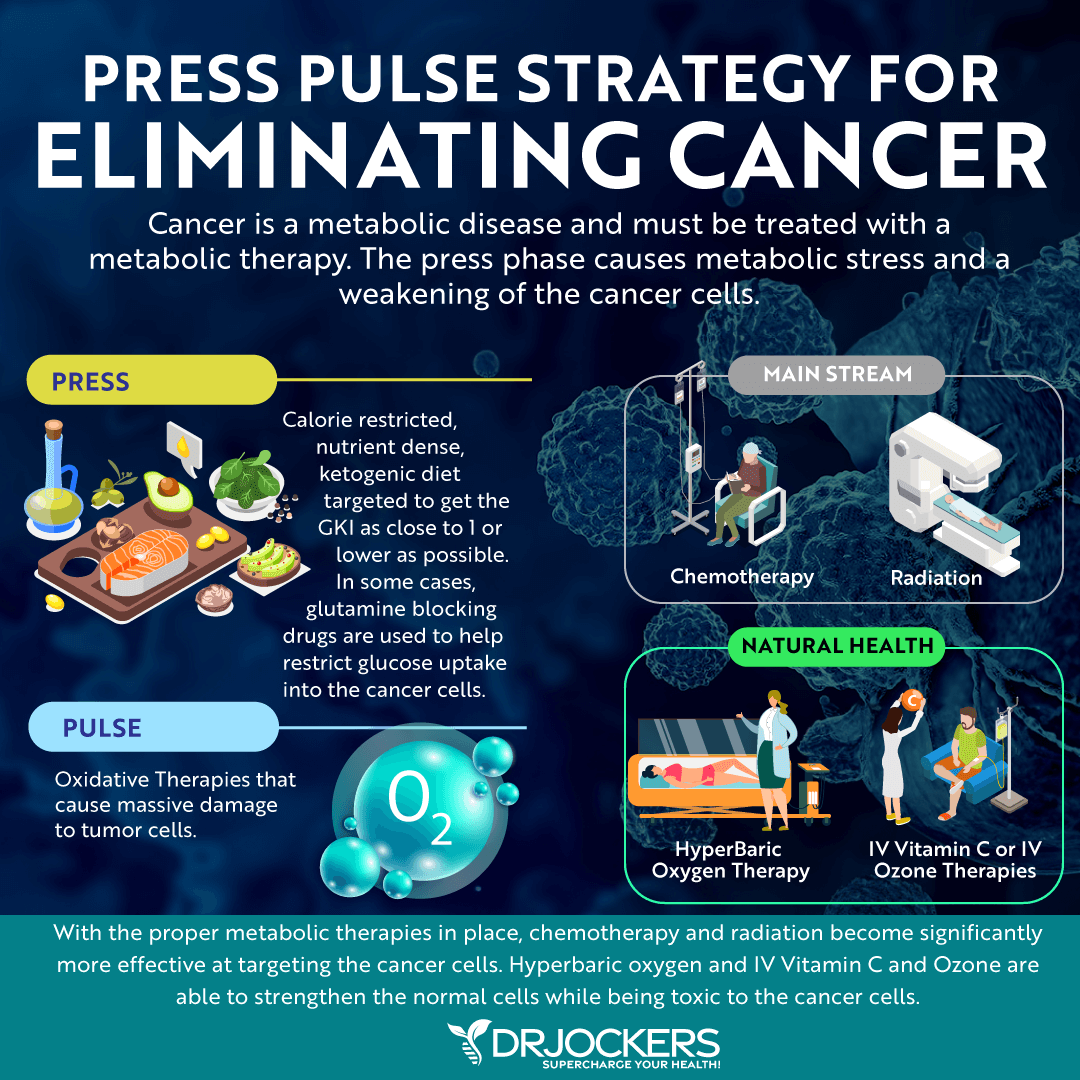
The Fasting Transformation Book
If you want to improve your metabolic health and burn fat, improve your brain and overall energy levels…intermittent and extended fasting are incredibly powerful strategies.
That is why I want to introduce you to my best-selling book, The Fasting Transformation. It goes into the most recent scientific research and strategies for implementing intermittent and extended fasting into your life.
This book is the best book on fasting the world has ever seen and I have read them all! It is now, my great honor to present this to you and I am deeply appreciative of your support!
Conclusion
Cancer is devastating and conventional treatments often contribute to harsh side effects. Fasting Strategies are a powerful and cost-effective way of improving your body’s fighting power against cancer cells. If you are currently battling cancer, incorporating a 48-72 hour fast once per week may be something to consider.
If you are undergoing conventional chemotherapy or radiation therapies, fasting at least 14 hours before treatment may help improve outcomes and mitigate side effects. Combining fasting with a plant-based ketogenic diet, hyperbaric oxygen therapy, and daily detoxification practices will go a long way in boosting your cancer fighting potential.

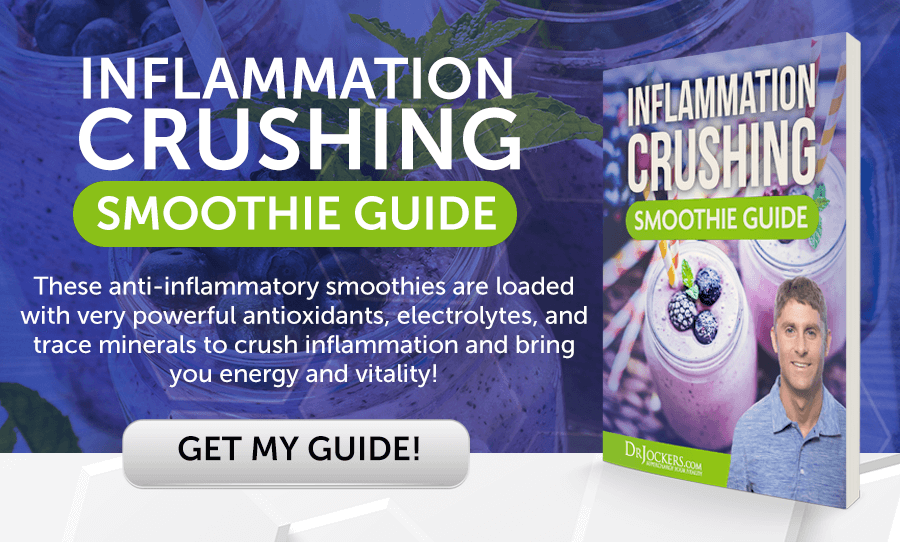 Inflammation Crushing Ebundle
Inflammation Crushing Ebundle
The Inflammation Crushing Ebundle is designed to help you improve your brain, liver, immune system and discover the healing strategies, foods and recipes to burn fat, reduce inflammation and thrive in life!
As a doctor of natural medicine, I have spent the past 20 years studying the best healing strategies and worked with hundreds of coaching clients, helping them overcome chronic health conditions and optimize their overall health.
In our Inflammation Crushing Ebundle, I have put together my very best strategies to reduce inflammation and optimize your healing potential. Take a look at what you will get inside these valuable guides below!
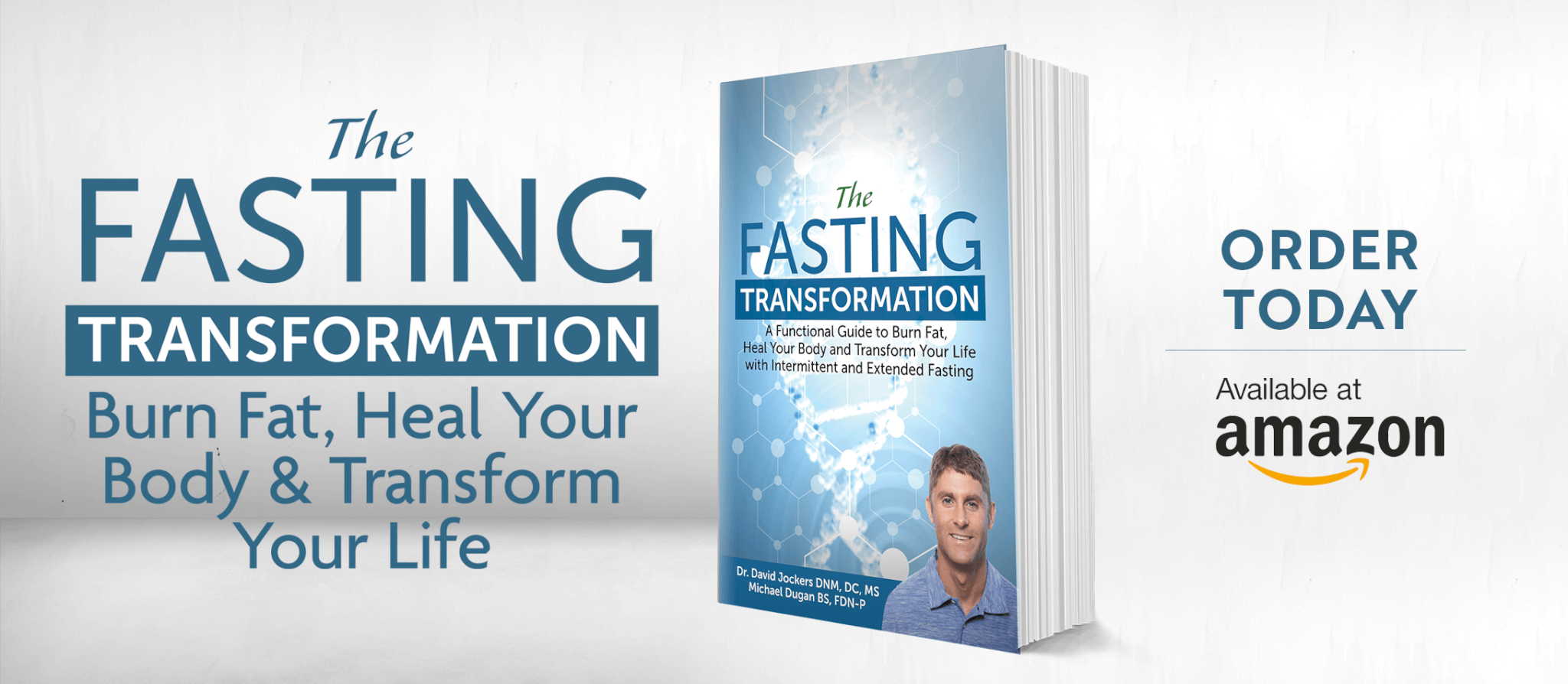




Fasting for 21 days or longer is recommended? For months? For a year? Will eating only dinner every night for a year or 2 years be healthy?
Hey Mar, 3-7 days is safe for most people. Some can tolerate a 21 day or longer fast but you would want to be under the supervision of a doctor who has experience with this. You could try only eating dinner, however, you may find it difficult to obtain adequate calories in one meal alone and over time this would be harmful for the body. Instead try intermittent fasting where you consume your meals within a 6-8 hour window each day.
When doing a prolonged fast are we targeting only micronutrients? During the fast should we continue taking any micronutrient supplements we are using, like D3 and B-complex, as usual?
Silly typo. I meant to ask, “are we targeting only MACROnutrients?”
Hey Greg, this is up to you. The primary things to consider are hydration and minerals! Reverse osmosis water and a bit of celtic sea salt will do the trick. Getting out in the sun as much as possible without burning can also be really helpful during this time.
Great information. Would you also write about remedies such as Melatonin supplement, Artemisinin, Simarouba glauca, reishi, etc.?
Would hyperbaric oxygen chambers help treat all cancers, including leukemia or are they only for cancerous tumors? What about infrared therapy [far and near infrared therapies separately]?
Hey RC, this article may be helpful for you: https://drjockers.com/beginning-cancer-healing-journey/
hay doc
our water has added toxic chemicals reverse osmosis takes out all the minerals including the beneficial ones. adding a little sea salt is fine but wouldn’t it be better to have a water system that adds oxygen into the water we use daily drinking and washing? which is the best water system to use?
water with lemon,lime ,cucumber or tea instead of coffee?
jucing?
Hey Liz!
Omica Organics has a great RO system that also remineralizes the water! Great for drinking water. They also have shower filters! All of those are great drink options you mentioned. Tea and coffee are fine if you tolerate them well.
I am now on 2 different chemo pills that I take twice daily. How do you fast with that?
It depends upon your particular case, but please discuss this with your functional health care practitioner.
Hi, should i continue to take my vitamin C during my 5 day water fast for breast cancer?
Can ginger and turmeric herbal tea be taken during a fast?